|
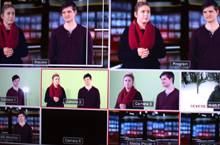 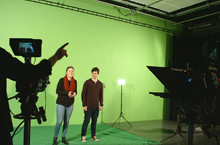  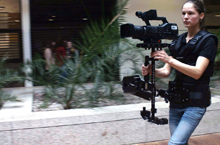  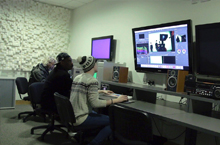  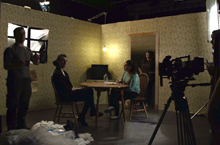 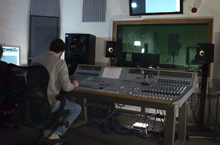
Background:
Dundalk Institute of Technology (www.dkit.ie) is situated half-way between Dublin and Belfast.
The School of Informatics & Creative Arts is one of the four Schools in the college and is home to the Department of Creative Arts, Media and Music.
The Department of Creative Arts, Media and Music at DkIT is a cultivator of creativity and thought, where lecturers and students actively engage with new technologies. Operating on the principle of mutual support and respect, we challenge convention, foster collaboration, and educate the next generation.
The Department is based in the world-class facilities of the Carroll building on the DkIT campus, equipped with a full HD TV Studio, a HD screening room with Dolby Surround Sound and editing labs & suites. See https://www.dkit.ie/creative-arts-media-music/resources-facilities for more details on these facilities.
DkIT is also a Blackmagic Design and Avid Educational partner & students can choose to sit the associated user certification exams while undertaking their programme.
| Student work has been showcased in the following festivals: |
- Celtic Media Festival
- Galway Film Fleadh
- Belfast Film Festival
- Fastnet Short Film Festival
- Cinemagic Film Festival
- Guth Gafa International Documentary Film Festival
- International Sci-Fi festival (Arizona, USA)
- Kerry Film Festival
- Clones Film Festival
- Darklight Digital Festival
|
- Maribor Film Festival (Slovenia)
- Waterford Film Festival
- Newry Film Festival
- Fingal Film Festival
- Best in Show
- LIT Film Festival
- National Student Film Festival
- National Student Media Awards (Smedias)
- Underground Film Festival
- FEST Portugal
- Dublin International Film Festival First Frame
- Louth International Film Festival
|
|
|
|
The Department of Creative Arts Media and Music offers the following programmes in the creative media area along with music programmes at both undergraduate and postgraduate level:
BA (Hons) in Film & Television Production
– 4-year Level 8 - www.dkit.ie/filmtv
Delivered by highly respected professionals, using industry-standard equipment, this four-year honours degree delivers a mix of practical, theoretical and industry-based knowledge and skills, designed specifically to prepare you for the workplace and to advance your skills to the highest level. The course is approximately 60% practical and allows students to specialise in areas such as TV Studio Production, Documentary Film Production and Drama Production for Film and Television. It also includes an industry work placement in Year 3. Areas covered include Cinematography, 35mm Photography, Audio & Video Post Production, Screenwriting, Production Studies, Sound Design, Pre Visualisation, Film Studies, TV Studio Production and Short Film Projects, amongst others. Based in the state-of-the-art Carrolls building on the DKIT Campus, students undertaking this course have a unique opportunity to create ambitious and outstanding work. Previous work by students has won Royal Television Society Awards and screened at a wide variety of film festivals both nationally and internationally. Over 90% of students are in work after graduating. According to Hollywood Film Director and Dundalk-native, John Moore, ‘DKIT is important beyond words for future filmmakers in the region.’
BA (Hons) in Creative Media and BA in Creative Media
– 4-year Level 8 & 3-year Level 7- www.dkit.ie/cmedia
The aim of the level 8 and level 7 programmes is to produce Creative Media professionals with the necessary knowledge, skills and competencies to work within the varied Creative Media Industries in Ireland and abroad. Part of the nature of these Industries is that they are dynamic and innovative; on practical and technical fronts there are continuing updates to terminologies and technologies. The programme merges practical experience in existing and emergent creative media and digital platforms with a user-centered and industry aware approach to design and this balance will offer students the opportunity to develop a combination of professional and creative skills and equips them for the rapidly changing industrial environment. By balancing content creation alongside teamwork and entrepreneurial skills, these courses equip students to pursue graduate level positions across divergent sectors in the creative media industry. The programme's unique selling point is that it is an undergraduate degree that will create graduates who are idea-driven content designers competent in communicating through a variety of mediums and who have had the space to test out media theories through practical work.
BA (Hons) in Audio & Music Production/BA in Audio & Music Production
- 4-year Level 7 and 3-year Level 7 - https://www.dkit.ie/courses/school-of-informatics-and-creative-arts/creative-arts-media-and-music/ba-(hons)-in-audio-and-music-production.html
The aim of this programme is to produce Audio Industry professionals, with a skill set that allows them to compete in a variety of industry roles across location sound, sound engineering, music production and sound for film, television, and games. The programme is skills-focused and delivered by industry professionals and a highly qualified teaching staff with both industry and academic accreditation. Opportunities for work placement, study abroad and collaboration with other programmes are provided and you will be working with industry-standard equipment and software. This programme offers a unique opportunity to develop a range of audio and music production related skills with many graduates already excelling in the industry.
Masters by Research and Ph.D. by Research
- 2-4 years - https://www.dkit.ie/about-dkit/academic-schools/school-of-informatics-and-creative-arts/department-of-creative-arts-media-and-music/ma-by-research-/-phd-in-creative-arts,-media-and-music.html
The aim of our postgraduate programmes is to allow students work on a research project that links with their research interests and practice. Students can pursue a Masters or PhD by Research in the Creative Arts, which can involve a practice-based and/or a traditional research project. In order to enrol, a prospective student should submit a proposal for a research topic with which they would wish to engage to a member of staff or creativearts@dkit.ie, and researchers at DkIT can provide advice on developing an application, including identifying opportunities for funding. A supervisory team will be appointed to facilitate regular meetings and agree key deadlines for deliverables, while the candidate will become part of a vibrant, interdisciplinary postgraduate community at the Institute. Our experienced lecturing team at DkIT’s Department of Creative Arts, Media and Music and Creative Arts Research Centre are research active with research outputs including publications, compositions, films, documentaries and software. They provide expertise across a broad scope of research areas including film studies, gender studies, composing for screen, musicology/ethnomusicology, audio and music production, drama and theatre studies, game studies, animation and film production, and augmented and virtual reality.
BA in Theatre & Film Practice
This programme will provide a solid grounding in the practical application of both theatre and film production skills, a mix of which are currently unavailable to prospective students on the island of Ireland at this level, along with key acting skills and a theoretical foundation. The BA in Theatre and Film Practice will diversify the skills of potential performing arts students by allowing them to develop not only skills in voice, acting and movement, but also in film studies and film production & post-production. Uniquely, this programme will also allow students the opportunity to gain core skills in technical theatre practice, including set design and construction, sound and lighting design, costume design and stage management. They will also practice promotion, administration and management skills in their third year projects.
| Education and Training Profile: |
|
The BA (Hons) Film and Television Production in DkIT is designed to be 60% practical theory, offering training in all aspects of film and television production including camera, sound, lighting, editing and multi-camera TV studio shooting.
The course is based in the PJ Carroll's building on the DkIT campus which is equipped with a full HD TV Studio, a screening room, multiple edit suites, a video editing lab, multimedia labs, a radio studio, a dark room, an art studio and an equipment borrowing office. Students are trained on key software packages used in the film and TV industry, including Pro-Tools, Avid Media Composer, After Effects, Photoshop, Movie Magic budgeting & scheduling and Final Draft. DKIT is also a Blackmagic Design and Avid educational partner giving students the option of sitting the Avid and Pro-Tools user certification exams.
"One of the significant features of the Film and Television Production degree in DkIT is the practical focus of the programme. Students have the opportunity to work in our excellent facilities including our 4K TV studio and they produce a range of projects, many in partnership with industry" notes Dr Adèle Commins, Head of Department of Creative Arts, Media and Music. "Students also have access to a range of industry professionals who work with our students as part of the Department’s Visiting Guest Series. This series features producers, directors, editors and writers working in the industry.”
Modules in third and fourth year are also delivered by industry professionals including Jass Foley (Cinematography), Maurice Sweeney (Directing) and Aoife Fealy (Production Design).
|
Another key component of the course is the six week work placement which takes place in fourth year, which has acted as a springboard for past students to secure full and part-time roles within the participating companies upon completion of their degree.
In addition to the industry professionals teaching on the course, lecturers include Marina Hughes (Film Producer), Lorcan Dunne (Cinematographer/TV Director), Sarah McCann (Filmmaker and documentary director), Donal Dineen (Radio Presenter/DJ), Eamonn Crudden (Documentary Director/Editor), Kevin Cunnane (Editor), Richard Price (Audio) and Donal Beecher (Scriptwriter). Other course lecturers heavily involved in research and publication are Kelly McErlean and Ingrid Lewis.
|
|
|
|
|
